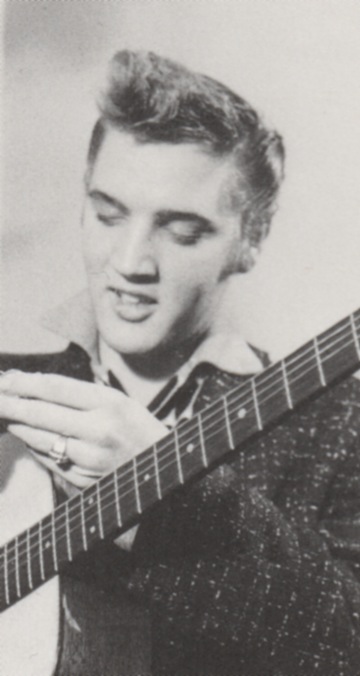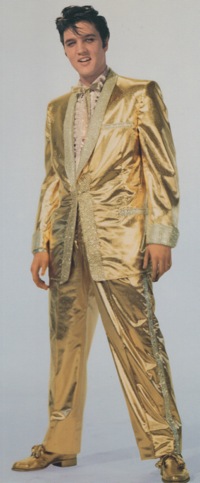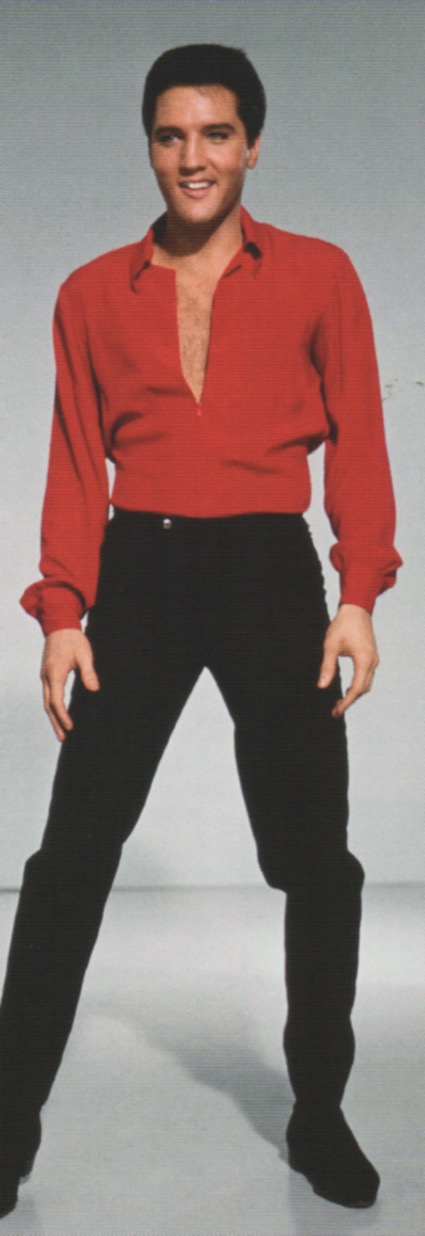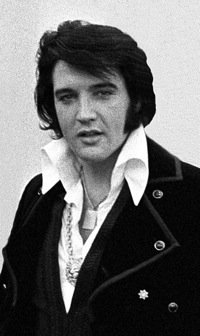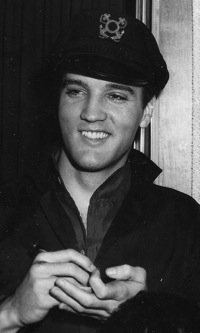Elvis History Blog
Elvis and Politics
The King Kept His Thoughts to Himself
In the politically polarized environment that is the United States these days, it’s quite common for well-known entertainers to make known their political views. Bruce Springsteen and The Dixie Chicks are two singing acts who have occasionally stepped from the concert stage to the political soap box to voice their opinions. Was Elvis politically aware during his long run at the top of the entertainment industry? And, if so, was he concerned enough to voice his opinions in the public arena? Most Elvis fans probably agree that the answer to the second question is “no,” but let’s go back and take a closer look at his life and see if we can find an “activist Elvis” anywhere along the way.
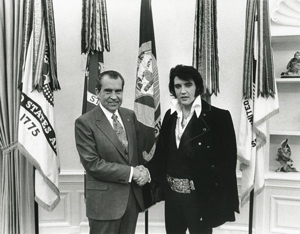
Of course, back in the 1950s, when Elvis first came on the scene, entertainers didn’t take strong stands on public issues like many do today. The specter of the McCarthy hearings, which led to some Hollywood figures being blackballed from the industry in the early fifties, may still have left some entertainers of Elvis’ era a bit fearful about criticizing the government. Some did speak out, though. One of them was actor Yul Brynner, who defended Elvis after the Los Angeles police filmed Presley’s show at the Pan Pacific Auditorium on September 29, 1957. An angry Brynner declared, “I hold no brief for Presley; I’ve never seen him. But when police are allowed to set up cameras and be judge, that’s an invasion of an artist’s rights and should be looked into mighty carefully by every artist and actors’ agency in our business.” Elvis not only made no statement of protest about the police cameras, he actually toned down his act because of their presence.
• Elvis: “I don’t hardly ever get a chance to read the newspapers”
As a young man then in the whirlwind of an exploding career, Elvis was simply too overwhelmed to keep up with the political events of the day. He was “In a World of His Own.” That was the headline over reporter Barton Hickman’s article in the Miami Herald on August 5, 1956. Hickman had attended Elvis’ Miami press conference the day before. The reporter came prepared with a series of questions to test the singer’s knowledge of current events. His conclusion: “Don’t think Elvis Presley is just putting on an act. He really is that ‘stupid’ about what’s going on in the world.”
Here’s a sampling of Hickman’s questions and Elvis’ responses:
Hickman: “What do you think of Egypt’s Premier Nasser grabbing the Suez Canal last week?”
Elvis: “Suez? Man, you’re talking French to me now.”
Hickman: “Do you think Stevenson is sure to be nominated at the upcoming Democratic National Convention?”
Elvis: “Well … maybe. I keep pretty busy. I don’t hardly ever get a chance to read the newspapers anymore.”
Hickman: “What do you think about the Stockholm-Andrea Doria sea disaster?”
Elvis: “Well, all I heard was there was a boat wreck … ”
Hickman: “Do you know which boat went down?”
Elvis: “No sir.”
A 12-year-old Elvis fan, Luther Voltz, was also at the press conference. “Golly, Presley doesn’t know anything about the news,” he said. “He doesn’t keep up on things. I just thought he was kind of dumb.”
• Elvis a “fervent” supporter of the Vietnam War … really?
Of course, a disinterest in following national and world news reflects … well … disinterest, and not stupidity, as Luther and Hickman concluded. Elvis’ lack of awareness was in common with many young adults in the late fifties. It wasn’t until the sixties that the Vietnam War made current events relevant to young people. That takes us to our next question: Where did Elvis stand on the Vietnam War?
In 2007, when my book Elvis ’57: The Final Fifties Tours, was going through the pre-publication process, it underwent what the publisher called a “manuscript editorial evaluation.” A one point, the evaluator took issue with a statement I made in the book, that being that Elvis “changed not only music, but also the values of America’s youth for decades to come.” He wrote in the evaluation, “Many observers, by the way, will disagree with this, accusing Presley of being a fervent supporter of the Vietnam War.”
Say what? I have been a Presley follower for 45 years and know of not a single public statement he ever made about the Vietnam War, either for or against it. Elvis may well have supported the war, but if so, he did it privately and certainly not in a “fervent” way.
• Elvis expressed his concern about the country to President Nixon
Some might infer that Elvis supported the Vietnam War from a statement in a letter he wrote to President Nixon in December 1970. Elvis wrote the rambling letter hoping to convince the president to issue him a Federal Agent’s badge, which had been denied him through normal channels. Early in the letter, Elvis wrote the following:
“I talked to Vice-President Agnew in Palm Springs 3 weeks ago and expressed my concern for our country. The drug culture, the hippie elements, the SDS, Black Panthers, etc. … ”
“SDS” refers to the “Students for a Democratic Society,” who had organized on college campuses across the nation in opposition to the Vietnam War. So Elvis’s “concern” about SDS could be viewed as implied support for the war, U.S. involvement in which Nixon had recently escalated. On the other hand, Elvis may have just been stroking the president here, since … ya know … Elvis really wanted that badge!
In fact, 18 months later, on June 9, 1972, Elvis was asked a question concerning the Vietnam War at the press conference preceding his famous Madison Square Garden concerts.
Question: “You were in the Army and were drafted. What is your opinion of war protesters? And would you today refuse to be drafted?”
Elvis: “Honey, I’d just soon to keep my own personal views about that to myself? Cause I’m just an entertainer and I’d rather not say.”
• Elvis was a great entertainer but never an activist
I think it’s safe to say that were Elvis alive today, he wouldn’t be stopping his concerts to rant about the national debt or foreign wars. He was a performer who changed the entertainment world. He had no illusions about or interest in changing the country’s political direction. Songs like “If I Can Dream” and “In the Ghetto” are classic Presley recordings. The messages, though, were not his. He didn’t write the lyrics. As an entertainer, he was arguably the best ever. Any attempt to diminish his legacy because he didn’t speak out against war and other social concerns is meaningless and unfair. — Alan Hanson | © April 2009
Reader Comment: I know Marty Lacker and Jerry Schilling, and other Elvis friends well. Both of these men would be considered rather liberal, while Elvis was no doubt, according to both of them and his own quotes, very conservative. He was very supportive of the Vietnam War; believed in a robust military and capital punishment; was against the ERA; and was appalled by abortion I was told. He was also very, very intelligent and read the papers quite a bit and could converse on any number of subjects. I recognize your piece focuses on some quiz or interview Elvis was given in the ’50s, but by the ’70s he was extremely well read and knowledgeable about everyday affairs. He was quite conservative, and that is from Schilling, who is very, very liberal. Schilling said, as far as he knew, Elvis was not registered, but if he were, Schilling said he would have been a registered Dem, but then, like so many other Dems of the South in the early ’90s, most likely became a Republican. — Christopher (September 2013)
Reader Comment: As Steve Binder correctly said, "Rednecks in America would be shocked at how liberal Elvis was." He obviously revered the office of president and kept his views mostly to himself, he wasn't a conservative. — Richard (May 2023)
Go to Elvis History
Go to Home Page
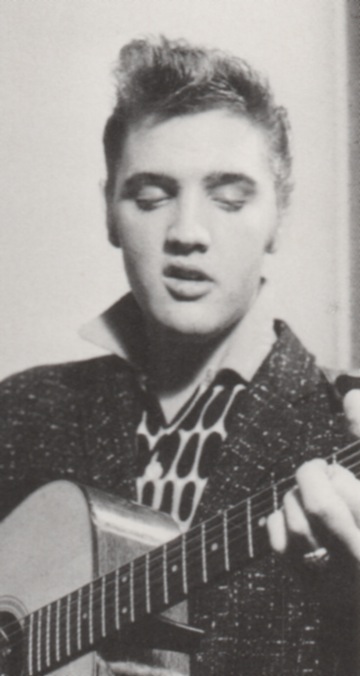
"Elvis was a performer who changed the entertainment world, but he had no illusions about or interest in changing the country’s political direction."
